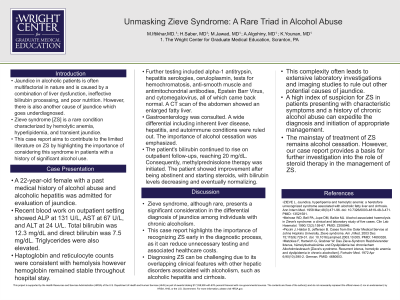Sunday Poster Session
Category: Liver
P1412 - Unmasking Zieve Syndrome: A Rare Triad in Alcohol Abuse
Sunday, October 27, 2024
3:30 PM - 7:00 PM ET
Location: Exhibit Hall E

Has Audio

Mohammad Faisal Iftikhar, MD
Wright Center for Graduate Medical Education
Scranton, PA
Presenting Author(s)
Hamza Saber, MD1, Mohammad Faisal Iftikhar, MD2, Mohammad Jawad, 3, Ahmed Algohiny, MD1, Kirelos Younan, MD1
1The Wright Center for Community Health, Scranton, PA; 2Wright Center for Graduate Medical Education, Scranton, PA; 3Medical University of the Americas, Elmont, NY
Introduction: Jaundice in alcoholic patients is often multifactorial in nature and is caused by a combination of liver dysfunction, ineffective bilirubin processing, and poor nutrition. However, there is also another cause of jaundice which goes underdiagnosed. Zieve syndrome [ZS] is a rare condition characterized by hemolytic anemia, hyperlipidemia, and transient jaundice. This case report aims to contribute to the limited literature on ZS by highlighting the importance of considering this syndrome in patients with a history of significant alcohol use.
Case Description/Methods: A 22-year-old female with a past medical history of alcohol abuse and alcoholic hepatitis was admitted for evaluation of jaundice. Recent blood work on outpatient setting showed ALP at 131 U/L, AST at 67 U/L, and ALT at 24 U/L. Total bilirubin was 12.3 mg/dL and direct bilirubin was 7.5 mg/dL. Triglycerides were also elevated.
Further testing included alpha-1 antitrypsin, hepatitis serologies, ceruloplasmin, tests for hemochromatosis, anti-smooth muscle and antimitochondrial antibodies, Epstein Barr Virus, and cytomegalovirus, all of which came back normal. A CT scan of the abdomen showed an enlarged fatty liver.
Haptoglobin and reticulocyte counts were consistent with hemolysis however hemoglobin remained stable throughout hospital stay. Gastroenterology was consulted. A wide differential including inherent liver disease, hepatitis, and autoimmune conditions were ruled out. The importance of alcohol cessation was emphasized.
The patient's bilirubin continued to rise on outpatient follow-ups, reaching 20 mg/dL. Consequently, methylprednisolone therapy was initiated. The patient showed improvement after being abstinent and starting steroids, with bilirubin levels decreasing and eventually normalizing.
Discussion: This case report highlights the importance of recognizing ZS early in the diagnostic process, as it can reduce unnecessary testing and associated healthcare costs. Diagnosing ZS can be challenging due to its overlapping clinical features with other hepatic disorders associated with alcoholism, such as alcoholic hepatitis and cirrhosis. A high index of suspicion for ZS in patients presenting with characteristic symptoms and a history of chronic alcohol abuse can expedite the diagnosis and initiation of appropriate management. The mainstay of treatment of ZS remains alcohol cessation. However, our case report provides a basis for further investigation into the role of steroid therapy in the management of ZS.
Disclosures:
Hamza Saber, MD1, Mohammad Faisal Iftikhar, MD2, Mohammad Jawad, 3, Ahmed Algohiny, MD1, Kirelos Younan, MD1. P1412 - Unmasking Zieve Syndrome: A Rare Triad in Alcohol Abuse, ACG 2024 Annual Scientific Meeting Abstracts. Philadelphia, PA: American College of Gastroenterology.
1The Wright Center for Community Health, Scranton, PA; 2Wright Center for Graduate Medical Education, Scranton, PA; 3Medical University of the Americas, Elmont, NY
Introduction: Jaundice in alcoholic patients is often multifactorial in nature and is caused by a combination of liver dysfunction, ineffective bilirubin processing, and poor nutrition. However, there is also another cause of jaundice which goes underdiagnosed. Zieve syndrome [ZS] is a rare condition characterized by hemolytic anemia, hyperlipidemia, and transient jaundice. This case report aims to contribute to the limited literature on ZS by highlighting the importance of considering this syndrome in patients with a history of significant alcohol use.
Case Description/Methods: A 22-year-old female with a past medical history of alcohol abuse and alcoholic hepatitis was admitted for evaluation of jaundice. Recent blood work on outpatient setting showed ALP at 131 U/L, AST at 67 U/L, and ALT at 24 U/L. Total bilirubin was 12.3 mg/dL and direct bilirubin was 7.5 mg/dL. Triglycerides were also elevated.
Further testing included alpha-1 antitrypsin, hepatitis serologies, ceruloplasmin, tests for hemochromatosis, anti-smooth muscle and antimitochondrial antibodies, Epstein Barr Virus, and cytomegalovirus, all of which came back normal. A CT scan of the abdomen showed an enlarged fatty liver.
Haptoglobin and reticulocyte counts were consistent with hemolysis however hemoglobin remained stable throughout hospital stay. Gastroenterology was consulted. A wide differential including inherent liver disease, hepatitis, and autoimmune conditions were ruled out. The importance of alcohol cessation was emphasized.
The patient's bilirubin continued to rise on outpatient follow-ups, reaching 20 mg/dL. Consequently, methylprednisolone therapy was initiated. The patient showed improvement after being abstinent and starting steroids, with bilirubin levels decreasing and eventually normalizing.
Discussion: This case report highlights the importance of recognizing ZS early in the diagnostic process, as it can reduce unnecessary testing and associated healthcare costs. Diagnosing ZS can be challenging due to its overlapping clinical features with other hepatic disorders associated with alcoholism, such as alcoholic hepatitis and cirrhosis. A high index of suspicion for ZS in patients presenting with characteristic symptoms and a history of chronic alcohol abuse can expedite the diagnosis and initiation of appropriate management. The mainstay of treatment of ZS remains alcohol cessation. However, our case report provides a basis for further investigation into the role of steroid therapy in the management of ZS.
Disclosures:
Hamza Saber indicated no relevant financial relationships.
Mohammad Faisal Iftikhar indicated no relevant financial relationships.
Mohammad Jawad indicated no relevant financial relationships.
Ahmed Algohiny indicated no relevant financial relationships.
Kirelos Younan indicated no relevant financial relationships.
Hamza Saber, MD1, Mohammad Faisal Iftikhar, MD2, Mohammad Jawad, 3, Ahmed Algohiny, MD1, Kirelos Younan, MD1. P1412 - Unmasking Zieve Syndrome: A Rare Triad in Alcohol Abuse, ACG 2024 Annual Scientific Meeting Abstracts. Philadelphia, PA: American College of Gastroenterology.
